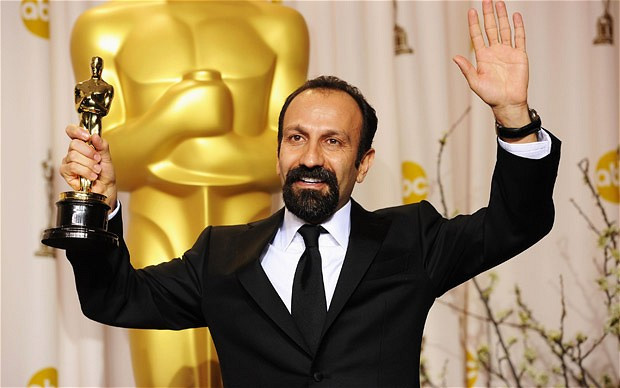
One of the main reasons I’m excited to see “The Salesman” when Fresno Filmworks brings it to the historic Tower Theatre on April 14 stems from Asghar Farhadi’s absence from the Academy Awards. The director was not present to accept the Oscar for Best Foreign-Language Film as he boycotted the ceremony in protest of a presidential travel ban from seven countries, including Farhadi’s own Iran. But the director did send his words, which were read by Anousheh Ansari, the first Iranian American to go to space:
“My absence is out of respect for the people of my country and those of six other nations whom have been disrespected by the inhumane law that bans entry of immigrants to the U.S.”
Absence, in this instance, is meaningful, powerful. Through absence, the Iranian master director was able to say and, perhaps, do more than he would have been able to do had he shown up to receive the award in person. In this case, absence is presence—the presence of what goes awry when we ignore or sidestep the issues that emerge in our relations with others.
Absence is likewise present in “The Salesman.” When we first encounter Emad and Rana, the couple is in the process of evacuating one dwelling and taking up another. This new apartment, while effectively empty of its previous residents, remains filled with their presence. A single woman and her young child remain present in the apartment through the stuff they left behind. This stuff haunts the couple, and later so does a violent assault committed against Rana in the shower of the apartment. Together, these absent presences reveal tensions in Emad and Rana’s marriage.
The absences that reveal and exacerbate this marriage’s hidden problems also highlight absence in a larger, social sense. In another way, this film is also about Tehran, which is to say, about a city made up of structures and institutions themselves made up of physical and social forces that make places livable, or not. In some ways Farhadi is precisely the director to make the types of absences that undermine the social fabric of civic life present through film. The way he trains the camera on details of a building, for example, that’s in danger of collapsing connects up with the absence of official authority, an absence which some will argue forces Emad to seek out a vigilante-type justice. It’s the type of absence that not only puts built structures at risk of failing, but social ones too.
Plato prefered speech over writing on the basis of absence and presence. He argued in “Phaedrus” that unmediated truth is made available through the presence of the speaker, whereas the truth available through writing is diluted because writing mediates presence. Film, it would seem, is always and only capable of offering a diluted truth. Because film is a visual representation (that originates in writing), audiences can only have a mediated presence of the director, of his or her intent. The director is always and necessarily absent from whatever truth is proffered through a film. Regardless of what Plato prefered, this may not be an altogether bad thing.
Farhadi made a deliberate decision to speak through a mediator on the night of the Academy Awards. He deliberately chose to be absent. The choice, it would seem, was meant to convey truth more readily than it would have been conveyed through his presence. Absence can be meaningful, powerful. It is the case in awards ceremonies, and it is the case in the mediated form of film. Farhadi also stated, through Ansari:
“Filmmakers can turn their cameras to capture shared human qualities and break stereotypes of various nationalities and religions. They create empathy between us and others, an empathy which we need today more than ever.”
I’m excited to watch “The Salesman” alongside other Central Valley residents precisely because film can, even as it operates through absence, help create empathy between us. As we continue on in a social and political context that daily threatens to create less desirable types of absences in our communities, it seems crucial that we seek out the type of experiences that fosters greater empathy.
Rubén Casas is an assistant professor of English at Fresno State, and he serves on the Filmworks board as a member of the marketing committee.
